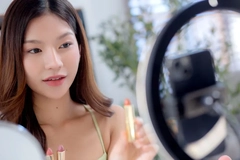L’Oréal uses protein tech for personalized skin device

L’Oréal Groupe has unveiled a device that provides personalized skin analysis in five minutes. The Cell BioPrint uses L’Oréal’s Longevity Integrative Scienceä, which shows how mechanisms in the human body can affect skin appearance.
The device uses advanced proteomics, which studies how protein composition in the human body affects skin aging. L’Oréal created the tabletop hardware through an exclusive partnership with Korean start-up NanoEnTek.
L’Oréal reports that the growth of the global skin care market is projected to reach US$125 billion in 2024 and attributes this to consumers seeking more information about products for their skin.
According to a 2022 survey conducted by CeraVe of 2,000 skin care users in the US, approximately 80% rely on trial and error to determine what works. The average person reported trying seven different cleansers before finding one that works for them.

“With skin being the largest organ and a key part of people’s well-being, we are thrilled to unveil Cell BioPrint, an exclusive microfluidic lab-on-a-chip technology coupled with our century-long skin science leadership,” says Barbara Lavernos, deputy CEO in charge of Research, Innovation and Technology at L’Oréal Groupe.
“With the Cell BioPrint device, we offer people the ability to discover deeper insights about their skin through specific biomarkers and to proactively address the beauty and longevity of their skin.”
Providing personalization
L’Oréal Cell BioPrint produces a personalized skin assessment that reveals the skin’s biological age, which indicates how fast the skin is aging. The Cell BioPrint can calculate skin’s age and provide personalized advice on how to slow down the appearance of aging.
It also tells the skin’s ingredient responsiveness, minimizing guesswork by helping to predict responsiveness to certain key ingredients, such as retinol.
 The Cell BioPrint is a physical device consumers can purchase for their homes.L’Oréal also says the tool can provide proactive skin care. The Cell BioPrint can help predict potential cosmetic issues before they become visible.
The Cell BioPrint is a physical device consumers can purchase for their homes.L’Oréal also says the tool can provide proactive skin care. The Cell BioPrint can help predict potential cosmetic issues before they become visible.
L’Oréal Cell BioPrint will pilot with a L’Oréal brand in Asia in 2025.
The device finds unique biomarkers in the skin that can indicate key components of healthy-looking skin and longevity, implementing science from L’Oréal’s Advanced Research team.
NanoEntek tech
The Cell BioPrint also features NanoEntek’s microfluidic lab-on-a-chip technology, which leverages some of NanoEnTek’s over 100 patents to measure the presence of L’Oréal’s protein biomarkers in five minutes.
The technology works through a non-invasive process. Users can apply a facial tape strip on their cheek and place it into a buffer solution. The solution should then be loaded into the L’Oréal Cell BioPrint cartridge and inserted into the machine for analysis.
While L’Oréal Cell BioPrint processes the sample, the Skin Connect device takes several images of the face and a short questionnaire about skin concerns and aging is conducted.
Personalized skin solutions
Innova Market Insights named “Customizing the Canvas” its eighth spot in personal care trends, with brands innovating to indulge their audience with more personalized products. In essence, brands are hyper-personalizing their products to attract consumer interest.
The market researcher attributes artificial intelligence (AI) to ushering in the personal care trend, with many brands creating AI skin assessment apps and tools to create personalized skin and hair care recommendations for consumers.
Revieve recently released its 2024 holiday trend report for beauty brands and retailers, highlighting growing customer preferences for personalized skin care. Revieve has collaborated with companies like CVS and No7 Beauty Company to create customized hair and skin experiences with AI.













